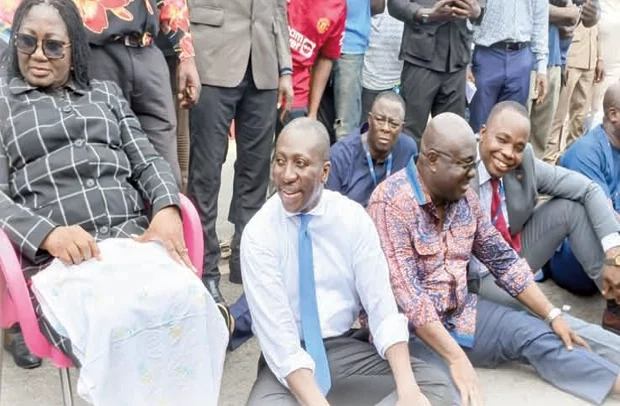Economic and Organised Crime Office
Members of the Minority in Parliament yesterday staged a dramatic walkout and subsequently picketed at the premises of the Economic and Organised Crime Office (EOCO), protesting what they described as unjust, excessive, and politically motivated bail conditions imposed on the Ashanti Regional Chairman of the New Patriotic Party (NPP), Bernard Antwi-Boasiako, popularly known as Chairman Wontumi.
The Members of Parliament (MPs) marched from Parliament House to EOCO, where they sat on the street in front of EOCO to demand the release of Chairman Wontumi.
The Minority, led by Leader Alexander Afenyo-Markin, had earlier raised the matter on the floor of Parliament as one of urgent public importance, drawing attention to what they claim is the “capricious and punitive” treatment of Chairman Wontumi by EOCO.
According to Afenyo-Markin, Wontumi, who had voluntarily honoured a police Criminal Investigations Department (CID) invitation in Accra, was forcibly arrested while leaving the premises and taken to EOCO without prior notice.
“In broad daylight, seven pickups blocked his vehicle and dragged him out like a criminal,” Mr. Afenyo-Markin told the House, pointing out, “He had cooperated fully with police, driven from Kumasi to Accra of his own accord, and yet EOCO treated him with such disdain.”
The Minority Leader further stated that following his detention, EOCO imposed a bail requirement demanding that Wontumi provide a surety with property valued at GH¢50 million before he could be released – a condition Mr. Afenyo-Markin said was “unlawful, vindictive, and inconsistent with constitutional guarantees of human rights and due process.”
“He is not running away. He has a fixed place of abode. He has shown willingness to cooperate,” Mr. Afenyo-Markin argued, saying, “This demand for landed property is not bail—it is punishment.”
He further alleged that when sureties presented themselves with documentation to meet the bail condition, they were told that the officials responsible for inspecting the property were unavailable.
He described the entire situation as “a calculated move to detain him by frustrating the bail process.”
In protest, Mr. Afenyo-Markin announced that the Minority would abstain from parliamentary proceedings and instead join Wontumi in solidarity outside EOCO’s premises until the bail terms are reviewed.
“We are ready to sleep with him if we must,” he declared, adding, “Until EOCO does the right thing, we are not coming back.”
However, the First Deputy Speaker, Bernard Ahiafor, who was presiding at the time, cautioned Parliament against overstepping its constitutional boundaries. He referenced Article 125 of the 1992 Constitution, which vests judicial authority solely in the judiciary and prohibits interference by any organ of state, including Parliament.
“Justice emanates from the people and is administered by the judiciary,” Mr. Ahiafor said, indicating that “Neither the President nor Parliament has final judicial authority. If anyone feels aggrieved by a bail condition or detention, the proper forum for redress is the courts – not Parliament.”
He acknowledged the Minority Leader’s concerns but insisted that the legislature has no authority to compel EOCO to change bail terms or release a suspect under investigation.
“Parliament is not a court of law. We cannot review decisions made by lawful investigative or judicial bodies,” Mr. Ahiafor stressed, bringing the debate to a close.
Despite the Deputy Speaker’s ruling, the Minority left the chamber in protest and proceeded to EOCO’s headquarters in Accra, where they staged a peaceful picket to draw national attention to what they say is an erosion of democratic freedoms and abuse of power by investigative institutions.
Meanwhile, Chairman Wontumi remains in EOCO custody under medical supervision. He was transferred to the clinic of the National Intelligence Bureau (NIB) after reportedly falling ill in detention. The Minority has raised further concerns over EOCO’s lack of medical facilities and the risk posed to his health.
By Ernest Kofi Adu


